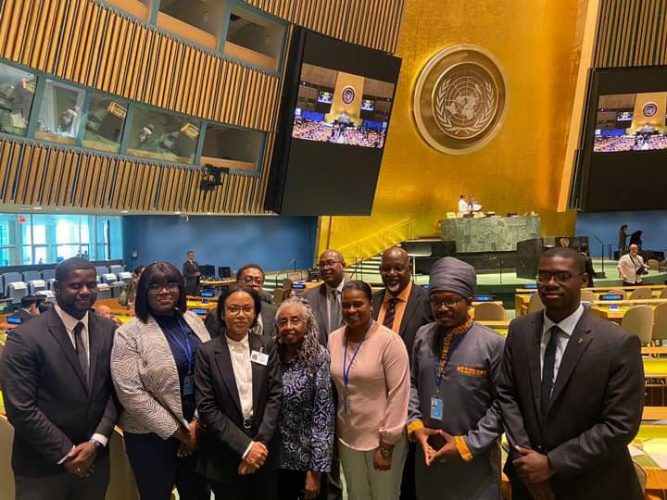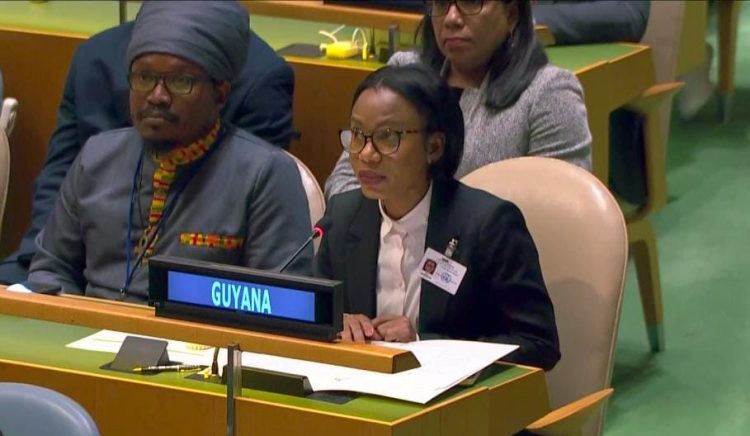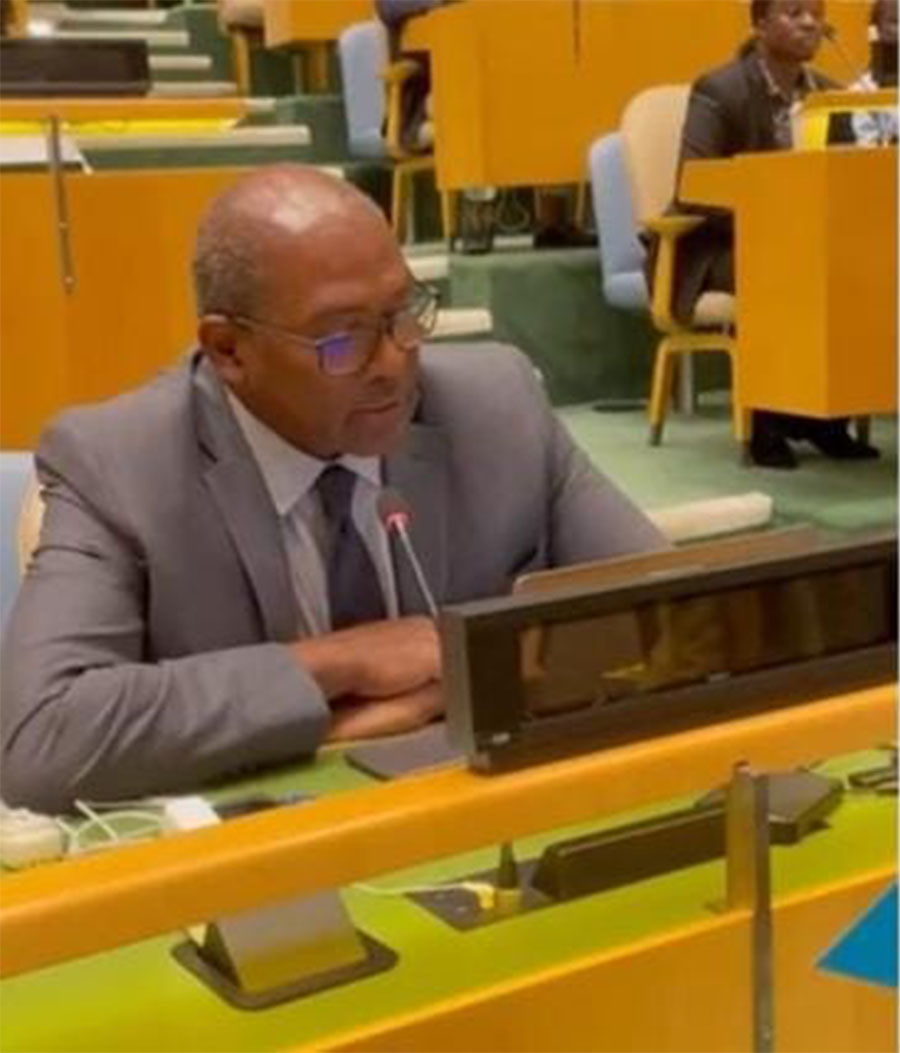While finding common ground on matters such as reparations for historical atrocities, a government delegation and one from IDPADA-G differed significantly on the state of the African-Guyanese population here when they made presentations recently at a UN forum.
The International Decade for People of African Decent-Guyana (IDPADA-G) and the Government of Guyana (GoG) addressed the Permanent Forum of People of African Descent Assembly at the United Nations (UN) Headquart-ers in New York. The meeting was held under the theme: “Realizing the Dream: A UN Declaration on the promotion, protection and full respect of the human rights of people of African descent.”

According to a release from IDPADA-G, discussions were held on five thematic areas – Global Reparatory Justice; Pan-Africanism for Dignity, Justice and Peace; Trans-national Migration; Recog-nizing and Addressing Systemic and Structural Racism; Data Driven and Evidence-Based Approach; and Health, Well-being and Intergenerational Trauma. The Guyana contingent provided five statements and presenters included attorney-at-law, Nigel Hughes, who spoke on Global Reparatory Justice; attorney-at-law, Darren Wade who presented on Transnational Migration; and Dr Terrence Blackman whose topic was on Recog-nizing and Addressing Systemic and Structural Racism; Data Driven and Evidence-Based Approach. The remaining statements dealt with Pan Africanism, and the Closing Statement.
The release also registered its concern that the “African Guyanese” Minister of Tourism, Industry and Commerce, Oneidge Walrond headed the delegation, instead of Minister Charles Ramson Jr, whose portfolio, it notes, includes matters pertaining to Reparations and the Decade for People of African Descent. This selection, it stated, raises questions about the intent of such representation, and the concerned Minister ceding, or not being allowed to, fulfill his responsibility.
The IDPADA-G also stated that the Government of Guyana “corralled and misused” the Ethnic Rela-tions Commission (ERC) by “clothing” two recently appointed members – Shaikh Moeenul Hack, the Chairman and Commis-sioner, and Deon Dick also known as ‘Ras Khafra’ – as its spokespersons and protagonists on racial equality and non-discrimination. This situation, it contended, “undoubtedly compromises the ERC Commis-sioners and by extension the Commission who are supposed to be independent of the Executive and when necessary, arbiters of the Government policies and actions, as provided for in their constitutional mandate.”

Walrond, who spoke on behalf of the GoG, told the forum that Guyana continues to uphold the dignity for people of African Descent by upholding their human rights through a legal framework.
Walrond said that the government is similarly interested in ensuring equitable access with the social initiative; such as free education, health, access to house and water, which is represented in 1/3 of the national budget.
She further pointed out that when one examines the judicial framework, it could be observed that it has also been working for the people of African descent through its independence.
“Our constitution guaranteed the right of protection from discrimination on the grounds of race, gender and religion, among others characteristics. These rights are testable before an independent judiciary of which Guya-nese of African Decent have historically been proportionally represented. At the apex of this judiciary is the Caribbean Court of Justice (CCJ).”
The Minister spoke to the issue of constitutional bodies and laws, with clear reference to the Ethnic Relations Commission (ERC), which ensures that people of African descent are protected against racial discrimination.
“Our institutional framework also features an independent Ethnic Relation Commission (ERC), a
constitutional body to which claims of racial discrimination may be made. This commission is empowered to investigate claims and to recommend appropriate penalties. A racial hostility act which criminalizes conduct which excites hostility against person on the bases of race. An elected official can be barred from holding office if found guilty of exciting race and hostility,” Minister Walrond said.
Historical atrocities
She also mentioned Guyana’s support for reparations for historical atrocities.
“Guyana continues to support reparations for historical atrocities, associated with slavery and the slave trade and is part of the Caricom Reparation Commission. We have also established a national committee for reparations,” Walrond declared.
She underscored that Guyana is a multi-ethnic society striving for unity among each race, and as such, Guyana will continue to support the forum, including a political declaration for people of African Descent.
IDPADA-G earlier this year wrote to the UN body about issues which still face the African community in Guyana. These complaints were noted and the UN body has forwarded them to the Government of Guyana seeking a response to the issues raised. That letter was reportedly received and government is expected to issue a reply to the body.
However, during the forum, those same issues were raised by IDPADA-G representative, attorney-at-law, Nigel Hughes. Hughes noted that much was needed to be done to ensure the rights of people of African descent are protected as the current situation in Guyana reveals too many instances of State oppression and exacerbation of racial tensions.
Hughes raised several arguments that the organisation felt highlighted that people of African descent are still not being treated fairly.
He pointed out that past injustices and crimes against people of African Descent have had lasting consequences, and there has been demonstrated only a modicum of progress where redress was concerned. He used as an example, the Land Commission of Inquiry conducted in December 2018, where one of the recommendations has been actioned to date.
He also noted that there has been no action on the Dutch apology for the benefit of African Guyanese.
The attorney also spoke of the GoG’s defunding of the IDPADA-G based on its perception that the organisation held an opposing view of the government thereby stymieing its work.
Similarly, he noted that IDPADA-G has also drawn attention to the area of natural resources, such as quarrying, mining, forestry, and agriculture, with the recommendation that the State and international bodies address inequalities in access to permits and titles with “alacrity.” Mention was made of the Guyana Geology and Mines Commission which is felt to have been unfairly denying quarrying concessions to African Guyanese with no course of redress.
Hughes also touched upon the absence of investment in the preservation of African Guyanese history and culture and called on the GoG to develop institutions to address loss of culture, enhance public recognition and understanding of the lasting consequences of systemic and structural racism and the incorporation of that history into textbooks.
As such, the IDPADA-G recommended that Guyana be called on to provide data and to report to the Permanent Forum or UN Special Mechanisms on steps taken towards reparative justice for persons of African Descent in all sectors.
National compensation package
“IDPADA-G calls on the Government of Guyana and International justice mechanisms to use these assessments to determine a national compensation package set aside from national revenues coupled with other forms of affirmative action”, Hughes was quoted as saying.
Additionally, Hughes posited that the government should also have a national commission that commences at a minimum, two national assessments of the African Guyanese contribution to the development of Guyana with a view to compensation, and start a review on a compensation report.
“It is imperative that the Government of Guyana establishes a national commission that commences at a minimum two national assessments of the African Guyanese contribution to the development of Guyana with a view to compensation. The first task of the National Reparations Committee should be a review of the Venn Commission Report of 1948-1949 which documents the contribution of enslaved people to the development to the British Guiana Sugar Industry under inhumane conditions without compensation. According to the Venn Commission Report of 1949, the colonial enterprise required hand labour to transform 15,000 square miles of coastal swampland to lands for sugar cane cultivation and for attending offices and housing for European planters. In fact, “the vast hydraulic system involved moving more than 100 million tons of mud, by hand labor was first carried out by enslaved Africans”, an enormous task for which there was no compensation.” Hughes explained.
IDPADA-G also addressed the issue of Pan-Africanism. It held the view that Pan-Africanism cannot be achieved “if there is recognition or identity deficiency at home or through platitudes and photo opportunities with African States.” The release posited that Afro-centric consciousness and expanded and meaningful cooperation and exchanges between Guyana and African States would contribute to greater understanding among ethnic groups in the country and promote the goals of Pan-Africanism.
In its discussion on the topic the delegation pointed out what it felt were several key points. 1) Guyana has been a significant player in the birthing and development of the Pan-African Movement as demonstrated in its support for the African Liberation Movement, however, in recent decades, the Pan-African connectivity waned however “we are witnessing its resurgence as a result of The International Decade for the People of African descent.”
2) Guyana’s evolution has been shaped by plantation and colonial systems, resulting in uneven ethnic development in Guyana with African Guyanese being the “most dispossessed economically” and reduced engagement with Africa.
3) The GoG’s non-recognition of the causal factors of the state of the African Guyanese is the “fundamental obstacle) to achieving the economic rights for the Afro-Guyanese community.
4) The GoG has not recognised the causal factors of the state of the African Guyanese and this it feels, is the fundamental obstacle to achieving the economic rights for their community.
5) The GoG’s priority on inclusive and participatory processes for all African Guyanese are not readily evident in national development nor in its outreach to global partners in Africa. However, in spite of apparent overtures to African countries with experience in oil and gas sectors, and other successful models of development, those overtures are pursued without and equitable consideration of the Africa Guyanese reality. This means that African Guyanese are not poised to be beneficiaries of what could otherwise fuel the resurgence of Pan-Africanism.
6) There has been more “robust” engagement with countries in the Middle East and Asia, in particular China and India, and no comparable exchanges between African countries and Guyana.
7) In light of the aforementioned, the Guyana delegation called on the GoG to act on its obligation to facilitate development in all spheres of the lives of African Guyanese and the Durban Declaration and Decade provides the “best framework” for sustainable and holistic actions, the release added.










